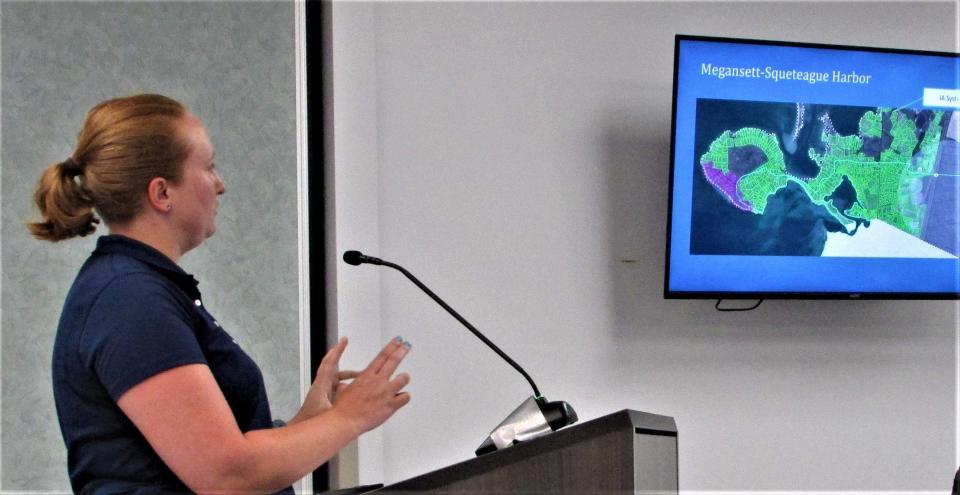Bourne creating plan to improve septic systems, protect watersheds
BUZZARDS BAY – Questions about upgrading septic systems at nitrogen-impacted watersheds on both sides of the canal raise questions, some of which emerged Tuesday night as Environmental Partners updated the sewer commissioners about progress on a Bourne comprehensive wastewater management plan (CWMP).
One question involves the cost to property owners to install septic systems containing new technology. Sewer Commission Chair Mary Jane Mastrangelo said that issue will be addressed at future meetings. Bourne's Board of Selectmen also serves as the Sewer Commission.
More: Firm to evaluate sites for new Bourne fire station ahead of town decision
Health Board Chair Stanley Andrews asked Environmental Partners representatives how various Bourne watershed maps were developed, delineating zones of contribution to nitrogen-affected areas.
Creating watershed districts
“We need good science on that,” Andrews said. “It’s a question the Board of Health will want to hear shortly. It would be helpful if the source of data used was attached to the (CWMP) document; to know the studies that were used to create the (watershed) districts.”
Environmental Partners Senior Project Engineer Kathryn Roosa told the commission everything undertaken in CWMP work pivots on “sound science” and that watershed mapping is based on the Massachusetts Estuaries Project of Impaired Embayments. She said watersheds as now delineated are based on hydraulic mapping corroborated by the Cape Cod Commission in its regional planning update.
More: Can Bourne continue to ban recreational marijuana shops? MA's highest court makes a ruling
Bob Dwyer of Pocasset suggested Environmental Partners contact the office on Joint Base Cape Cod, which has long dealt with restoration of Upper Cape drinking water, to determine the region’s hydrology.

What about rising sea levels?
Mastrangelo said Environmental Partners concepts about needed septic upgrades in watersheds focus fairly heavily on areas away from the coast, such as Monument Beach where the Phinneys Harbor watershed is mapped to include properties toward Route 28 (MacArthur Boulevard), more than two miles from the harbor.
Mastrangelo said she is more interested in “concepts at the shoreline” and how rising sea levels and other factors might create the potential for not opting to plan "innovative alternative" septic systems there.
She also asked how shoreline septic upgrades to remove nitrogen from the wastewater flow dovetail with Bourne’s climate resiliency planning.
More: Discharging wastewater into Cape Cod Canal discussed again in Bourne despite past objections
Mastrangelo said there is an apparent need for a “phased-in plan” for septic replacements and retrogrades.
Will there be workers to install new systems?
Keith Barber of Pocasset asked about the workforce needed to install state-of-the-art systems. He warns about “supply and demand issues” that could evolve to drive up prices. He said a Bourne summit of sorts might be useful to address potential problems with the need for septic workers.
Sewer commissioner Jared MacDonald said there are firms at work on the Cape now, installing systems. But he also acknowledged when Bourne moves forward on the septic front, “there will be a bigger boom.”
Mastrangelo said the recent OneCape Summit determined it is “logistically not possible” to quickly meet the need to upgrade or “switch out” septic systems in areas with delineated “total maximum daily loads” of nitrogen; notably Phinneys Harbor in Monument Beach and Squeteague/Megansett at Cataumet.
More: Finding solutions for housing, erosion, child care at the OneCape Summit
“The time of what to do and how to do it remains critically important,” she said. “There are various plans unfolding across the Cape. This is a ‘global’ issue that needs to be talked about — what to do and how to carry it out.”
Plan could go before TM voters in May
Environmental Partners Senior Project Manager Helen Gordon said a three-phase comprehensive wastewater management plan, which may head to the May 2023 Annual Town Meeting for voter scrutiny, is “a living plan” that will not be implemented within one year and would be subject to change. She said septic changes as now explained to the wider public for the first time are “concepts based on a most conservative perspective.”
Gordon said the plan will include policies that delineate financing of nitrogen removal projects in individual watersheds, the cost to the community, and issues such as a possible ban on lawn fertilizers.
She said there will be no conflict between the proposed Bourne comprehensive wastewater management plan as it still evolves and the new Massachusetts Title 5 law due this winter.
Sewer commissioners took no action Tuesday night. The session was classified as a board workshop and served as an assessment of EP work to date.
This article originally appeared on Cape Cod Times: Bourne creating plan to improve septic systems, protect watersheds

